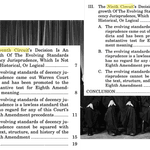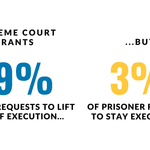Justices Debate How Courts Should Assess Aggravating and Mitigating Factors in Capital Cases on Appeal
On April 17, the Supreme Court heard oral arguments in Thornell v. Jones, a case implicating the test for ineffective assistance of counsel — and the first and only oral argument in a death penalty case scheduled this term. Arizona appealed the Ninth Circuit’s decision vacating the death sentence of Danny Lee Jones, which found that Mr. Jones was prejudiced by his attorney’s failure to present key mitigating evidence as to Mr. Jones’ brain damage, childhood physical and sexual abuse, and psychiatric problems. The case marks the second time the Supreme Court has considered a Ninth Circuit ruling on ineffective assistance of counsel in Mr. Jones’ case; the Court summarily overturned the Ninth Circuit’s 2011 decision in his favor. (See DPIC’s earlier reporting on the case.)
Under Strickland v. Washington (1984), an attorney is ineffective when 1) his performance is deficient, and 2) the deficient performance prejudices the defendant. When an attorney fails to present certain evidence, a court weighs the new evidence alongside the aggravating and mitigating factors present in the case and asks whether there is a “reasonable probability” that the outcome might have been different if the attorney had presented the new evidence at trial. All parties in this case agreed on the first prong — that Mr. Jones’ attorney, Lee Novak, performed deficiently at trial — but the oral arguments focused on whether the appellate courts properly weighed the factors when determining prejudice.

At oral argument, all the justices appeared to agree with Arizona that the Ninth Circuit did not properly account for the aggravating factors when it considered the new evidence of Mr. Jones’ traumatic life experiences and mental disorders. “The circuit court did lay forth the fact that it should balance aggravating and mitigating, but I accept that it really didn’t do that,” Justice Sonia Sotomayor said early in the questioning. Justice Elena Kagan later said that the Ninth Circuit “completely ignores all the aggravating evidence” and “has to look at the good and the bad.” The justices also discussed whether, in addition to the Ninth Circuit, the federal district court that conducted the evidentiary hearing weighed the factors properly. The district court found no prejudice against Mr. Jones. Justice Kagan said that the district court may have “misunderstood its role”; instead of weighing the evidence based on a “reasonable probability” of a different outcome, it “seemed to think that it was the factfinder” and made new conclusions about the quality of evidence before imposing what appeared to be a higher standard.
Some members of the Court have increasingly leaned on the concept of “finality” as rationale in recent decisions, and the issue arose again at this oral argument. While Mr. Jones asked that, in the event of a loss, the Court vacate and remand the case to give the Ninth Circuit another chance to conduct the Strickland analysis, Arizona asked the Court to go further and decide on its own whether Mr. Jones’ death sentence should stand based on his counsel’s performance. When Justice Sotomayor asked the state attorney why he sought the more serious and much less common remedy, he answered “finality” and argued that the case “has to end at some point.” Justice Gorsuch later echoed those words, asking whether there was “some value to everybody having some finality in this case” and arguing that “we have the whole record before us and nothing’s changed in 20 years.” Justice Sotomayor, on the other hand, pushed back. “That’s nice,” she told Arizona’s counsel, “but we’re not factfinders, and we generally don’t weigh evidence. There’s thousands of pages in this record.”
The Court will likely issue its decision in the case by the end of June.
Court Appears to Sidestep Challenge to “Evolving Standards of Decency” Test
On April 22, the Court heard oral argument in City of Grants Pass v. Johnson, a case involving a “camping ban,” a municipal law that targets unhoused people by criminalizing sleeping outside. While not a capital case, Grants Pass involves the Eighth Amendment’s prohibition on cruel and unusual punishment, which has been assessed under the “evolving standards of decency” framework for over sixty years. The Court applied this test to reach landmark rulings exempting certain groups from execution, including Ford v. Wainwright (1986) (people experiencing insanity), Atkins v. Virginia (2002) (people with intellectual disability), Roper v. Simmons (2005) (juveniles), and Kennedy v. Louisiana (2008) (people who commit non-homicide crimes).

In an amicus brief filed last September, the attorneys general of twenty states asked the Court to grant review in Grants Pass in order to strike down the “evolving standards of decency” test, arguing that courts “should not be tasked with judging the changing winds of society’s evolving morals” and should instead “return to declaring what the law is.” They advocate an “originalist” test, which purports to interpret the Eighth Amendment under its meaning at ratification in 1791. (Critics have argued that originalism “cherry-picks” historical evidence, lending itself to the subjectivity it claims to cure, and fixes the analysis at a time when women and people of color lacked basic rights.) “It’s clear that for at least some originalists on the Court, ‘evolving standards of decency’ is a travesty, and on their wish list of things to get rid of,” said capital punishment scholar Carol Steiker ahead of the Grants Pass argument.
Sections of the brief are virtually identical to an amicus brief filed five days earlier by thirteen of the same attorneys general in the death penalty case Hamm v. Smith, in which the Court has yet to issue a certiorari decision. Alabama appealed the case last August after lower courts vacated Joseph Clifton Smith’s death sentence based on a finding of intellectual disability under Atkins. The Court has pushed its decision on Smith back months, rescheduling five times and relisting the case twelve times after it was first considered at conference. This makes Smith a significant outlier in a docket where few cases are ever relisted, and only about 20% of relisted cases are relisted more than four times.

However, the challenge to “evolving standards of decency” appears to have faded at least from Grants Pass; neither of the parties mentioned the test at Monday’s oral argument. The justices and advocates instead focused on whether the law punished the “status” of being homeless. Additionally, the states filed a new brief in March that dropped the argument opposing “evolving standards of decency” entirely. Though Professor Steiker said that altering the test would have a “major effect” on capital punishment cases, she also commented in 2022 that she found a full upheaval “unlikely.” She doubted that all the justices would be willing to “throw out 50 years of precedent, dozens of cases,” and predicted instead that the Court would “nibble around the edges in lessening restrictions on the death penalty.”
Justices Share Philosophies on Stays
On April 15, in Labrador v. Poe, the Court allowed portions of Idaho’s ban on gender-affirming care for minors to take effect by voting to stay the district court’s injunction against the law. While Poe is also a non-capital case, the decision provoked written statements by multiple justices defending their positions on issuing stays, which offer insight into the Court’s approach to stays of execution in capital cases.

In a concurrence joined by Justice Amy Coney Barrett, Justice Brett Kavanaugh noted that stay applications “can require this Court to assess the merits on a tight timeline — without the benefit of many reasoned lower-court opinions, full merits briefing, and oral argument.” He acknowledged that “that scenario is not always optimal for orderly judicial decisionmaking.” However, he rejected the idea that those factors should lead the Court to defer to lower court rulings. “The emergency docket has always existed, and both the Court and even individual Justices acting in chambers have made a plethora of important decisions for the Nation in an emergency posture,” he wrote. One of the “important decisions” he cited in support of the Court’s emergency authority was Rosenberg v. United States (1953), which vacated stays of execution for Ethel and Julius Rosenberg (pictured), the only people put to death for peacetime espionage in American history. Their execution generated wide criticism, and the couple’s sons continue to fight to prove Ethel’s innocence. (Ethel’s execution by electrocution was also botched; she had to be strapped back into the chair for additional charges, and witnesses reported smoke rising from her head).
Justice Ketanji Brown Jackson, joined by Justice Sotomayor, dissented from the decision and argued that the Court must “proceed with reason and restraint” when intervening in emergency cases. “Few applicants can meet our threshold requirement of ‘an exceptional need for immediate relief,’ by showing that they will suffer not just substantial harm but an ‘irreversible injury…occurring during the appeals process that cannot be later redressed,’” she wrote. She stressed the importance of “respect for lower court judges — no less committed to fulfilling their constitutional duties than we are and much more familiar with the particulars of the case.”

Death-sentenced prisoners facing execution are some of the few applicants who can demonstrate an “irreversible injury,” their death, if they do not receive emergency relief — yet the Supreme Court routinely lifts lower court stays of execution, stays issued by judges in lengthy decisions with much greater familiarity with the case facts. The Supreme Court, by contrast, typically provides no explanation. These decisions occur on the “tight timeline” that Justice Kavanaugh admits undermines the Court’s ability to make a reasoned decision. In the 2018 through 2022 terms, the Court has lifted four times as many stays of execution as it has granted. The Court has granted 89% of requests by states to lift stays of execution, compared to 3% of prisoner requests to stay an execution.
Justices Jackson, Sotomayor, and Kagan have regularly dissented from the Court’s decisions lifting lower court stays. “In my view, we should resist being conscripted into service when our involvement amounts to micromanaging the lower courts’ exercise of their discretionary authority,” wrote Justice Jackson in Poe.
Rachel Reed, Supreme Court preview: City of Grants Pass v. Johnson, Harvard Law Today, April 22, 2024; Labrador v. Poe (2024); Maurice Chammah, Shannon Heffernan, and Beth Schwartzapfel, This Supreme Court Case on Homelessness May Limit Prisoner Rights and Expand Executions, The Marshall Project, April 10, 2024; Idaho, Montana, and 22 Other States, Amicus Brief Supporting Petitioner, City of Grants Pass v. Johnson, March 1, 2024; Idaho, Montana, and 18 Other States, Amicus Brief Supporting Petitioner (Seeking Certiorari), City of Grants Pass v. Johnson, September 25, 2023; Idaho and 13 Other States, Amicus Brief Supporting Petitioner (Seeking Certiorari), Hamm v. Smith, September 20, 2023; Petition for Certiorari, Hamm v. Smith, August 17, 2023; Ruth Marcus, Originalism is bunk. Liberal lawyers shouldn’t fall for it., The Washington Post, December 1, 2022; Shinn v. Ramirez (2022); Andrew Cohen, The Eighth Amendment, the Death Penalty, and the Supreme Court, Brennan Center for Justice, February 22, 2022; Ralph Mayrell and John Elwood, The statistics of relists over the past five terms: The more things change, the more they stay the same, SCOTUSblog, January 4, 2022; Rosita Boland, Ethel Rosenberg: a gruesome death by execution that shocked the world, The Irish Times, June 26, 2021; Ryan v. Jones (2011); Strickland v. Washington (1984).



